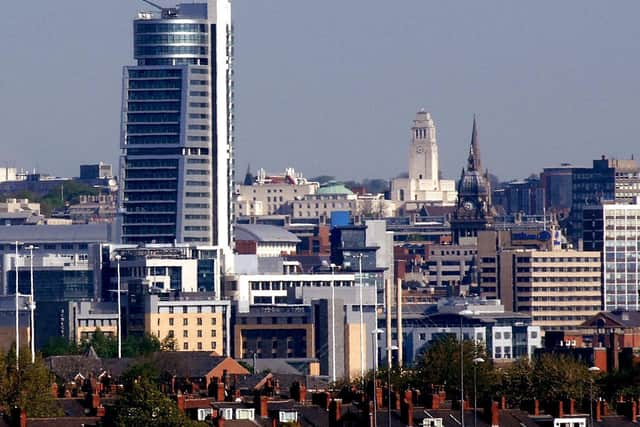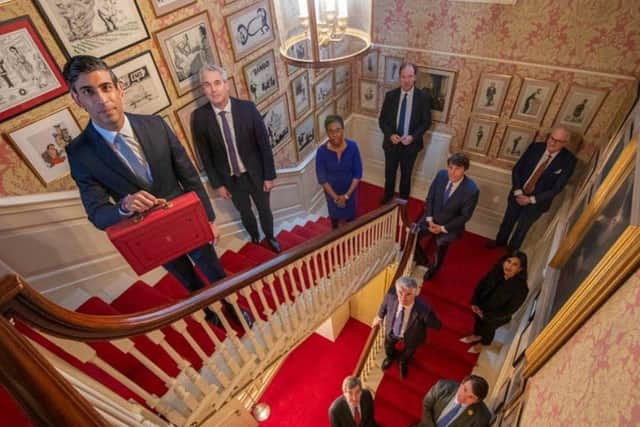Why the Infrastructure Bank coming to Leeds is good news for Yorkshire but less so for the UK - Mark Casci
Due to the Allied naval blockade of Germany and Austria-Hungary, ersatz, literally translated into English as ‘substitute’ began to refer to the replacement of products with items which were inferior.
These included wood and paper being used for the soles of shoes and the infamous ‘war sausage’ which was made from an unholy combination of water, plant fibres, animal scraps and blood.
Advertisement
Hide AdAdvertisement
Hide AdLast week’s Budget saw the announcement of the much-vaunted United Kingdom Infrastructure Bank (UKIB) and the fact that it will be located in Leeds.


The newly-created bank will extend loans, equity financing and guarantees to fund projects that will help tackle climate change and to support regional and local economic growth.
Any investment into our region will always be welcome, particularly when it is of national significance and the fact that the bank will be located in Leeds follows hot off the heels of similar investments in recent years such as those announced by the likes of Channel 4, Boeing and Siemens.
A common grievance shared between so many business people in our region is that the impact of national success stories are infrequently felt in Yorkshire and the North. However, with this announcement I fear that the bank, announced with such glee by Chancellor Rishi Sunak, may have the opposite impact in that its real-time benefits will be more concentrated on the city it is based in, rather than nationally.
Advertisement
Hide AdAdvertisement
Hide AdMr Sunak told MPs: “The bank will invest across the UK in public and private projects to finance the green industrial revolution.” But will it?


The Treasury has placed a £12bn limit on the bank’s capital for the next five years. All of this sounds like a vast sum of money but it is some way short of the £20bn recommended by the Treasury’s own commission set up to examine its feasibility.
And when you compare it to say the €506bn in assets that is boasted by the KfW, Germany’s long-established infrastructure bank, it really does not stack up. KfW assets are worth around 14.7 per cent of Germany’s GDP, 147 times larger than the UKIB.
I am not alone in my scepticism as to the reach and potential of this new institution. The Office of Budget Responsibility, which carries out analyses of each Budget statement, has said the value of the bank is so low that it has not adjusted its economic forecasting to reflect its impact.
Advertisement
Hide AdAdvertisement
Hide AdIndeed in its assessment document of the Budget it noted: “Our fiscal forecast reflects the direct effect of the bank’s activities on public sector net debt (which rises to £6.6bn by 2025-26) and its more modest effects on public sector net borrowing (which lower it by amounts that rise to £0.3bn in 2025-26, largely from guarantee fees).”
It also notes that the value of the bank’s investments are significantly lower than another investment bank we used to have access to, namely that offered by the European Investment Bank (EIB). As an EU member state, the UK received almost £89bn in loans and equity from the EIB between 1973 and 2019. Indeed, in the five years prior to the EU referendum in 2016, its lending to UK projects averaged £5bn a year.
The Government’s own forecasts predict the UKIB will lend and invest around £1.5bn a year, equivalent to around a third of the financing that was provided by the EIB prior to the referendum.
The Chancellor did deliver much of what business leaders have been telling me for weeks what the region needed (extension to furlough, business rate holidays). And public money is tight given the colossal cost of bailing out the economy during the crisis.
Advertisement
Hide AdAdvertisement
Hide AdThe UKIB will bring highly skilled and well-paid jobs to Leeds, which is, of course, great.
But what our region and our country needs now is a massive and ambitious plan to rebuild.
When all we are left with is something that very much resembles ersatz compared to what we enjoyed previously, I can’t help feel we have been handed a portion of war sausage.